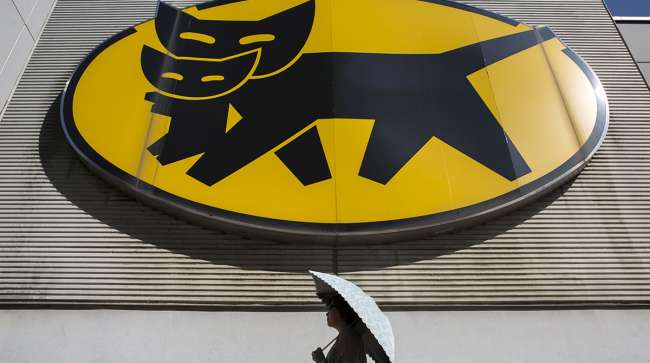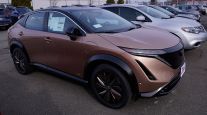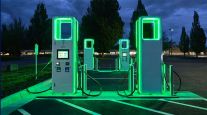Japan Times
Yamato Transport Rolls Out Electric Vehicles for Parcel Delivery Near Tokyo

[Stay on top of transportation news: Get TTNews in your inbox.]
Yamato Transport Co. unveiled on Nov. 19 what it says is a greener, compact, driver-friendly electric truck that may offer hope for coping with the acute labor shortage in Japan’s door-to-door parcel delivery industry.
The 2.85-ton truck measuring about 15.4 feet long, 5.9 feet wide and 7.2 feet high is small enough that it can be driven with a regular driver’s license.
With the new EV, the major transport company is trying to improve its working conditions and attract more female and elderly workers to adjust to the nation’s rapidly graying population.
The new truck will broaden opportunities for holders of regular driver’s licenses. Yamato already has small trucks that only require the regular license, but the new electric vehicle has a larger capacity.

In our first episode of RoadSigns, Season 5, we ask: How Will Machine Learning Enhance Transportation Software? Machine learning promises to supply your shippers with better freight visibility with one click, better manage your driver profiles and increase retention with easy software. But, Seth Clevenger wonders, will these technologies really continue to provide trucking and logistics managers with better decision and support solutions for real-world problems tomorrow? At the 2019 McLeod Software User Conference, our host discusses all this with company CEO Tom McLeod. Hear a snippet, above, and get the full program by going to RoadSigns.TTNews.com.
“[It] will expand employment opportunities for women and men,” CEO Toshizo Kurisu said during a news conference in Tokyo.
“[The new vehicle] can cater to Yamato employees’ requests that they want to switch from a large delivery vehicle to a small one due to their age,” he added.
Yamato said the vehicle is Japan’s first small commercial electric truck designed specifically for parcel delivery. It was co-developed with StreetScooter GmbH, a subsidiary of leading mail and logistics company Deutsche Post DHL Group.
Yamato plans to start introducing sequentially 500 of the new EVs for deliveries in Tokyo, Kanagawa, Chiba and Saitama in January.
The vehicle’s specifications are designed to lessen physical strain on the driver and be more female-friendly, the company said, highlighting that the driver’s seat is flat and at the same height as that of standard passenger cars, allowing women to easily get in and out.
The cargo hold can be opened from any side so drivers can unload packages without climbing into the vehicle. The height of the cargo bed — about 3 feet from the ground — eliminates the need to bend to reach parcels, making the job easier on the driver’s back. The cargo hold has a maximum capacity of 1,323 pounds.
When all 500 EVs are in service, the company estimates that emissions could be reduced by 3,500 tons of carbon dioxide annually.
Yamato wants to have about 5,000 EVs on the road by 2030, replacing half of the small gasoline-powered delivery vehicles it now deploys.
The firm’s announcement comes as the nation’s delivery sector battles growing volume fanned by consumers’ shift to online shopping coupled with a chronic labor crunch in the transport industry.
The job-to-applicant ratio for vehicle-driving occupations was 3.1 in September without seasonal adjustments, while the average across industries was 1.57, according to the labor ministry.
Yamato says improving its work environment is a top priority to attract more workers amid the acute labor shortage.
Developing safer, manageable and efficient vehicles for drivers is part of those efforts, the company said.
Other firms with a focus on door-to-door deliveries also are introducing EVs, which should help curb the nation’s carbon footprint.
Japan Post Co. has said it will introduce 1,200 electric vehicles for mail and parcel deliveries in Tokyo and other major cities by the end of fiscal 2020. In Tokyo, the introduction will replace 30% of the company’s fleet of gasoline-powered vehicles.
The first batch of 20 EVs — models of Mitsubishi Motors Corp.’s Minicab-MiEV van painted red and adorned with the Posukuma bear mascot — began carrying mail Nov. 13 at the Ginza Post Office in Chuo Ward, Tokyo.
Mitsubishi Motors has said that swapping out gasoline vans for its EVs will reduce greenhouse gas emissions by 50% per vehicle.
Want more news? Listen to today's daily briefing:
Distributed by Tribune Content Agency, LLC




